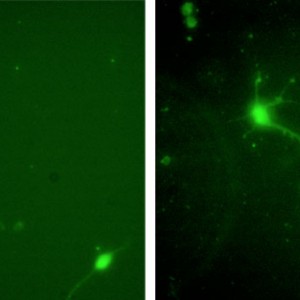A better way to culture central nervous cells
A protein associated with neuron damage in people with Alzheimer’s disease is surprisingly useful in promoting neuron growth in the lab, according to a new study by engineering researchers at Brown University. The findings, in press at the journal Biomaterials, suggest a better method of growing neurons outside the body that might then be implanted to treat people with neurodegenerative diseases.
The research compared the effects of two proteins that can be used as an artificial scaffold for growing neurons (nerve cells) from the central nervous system. The study found that central nervous system neurons from rats cultured in apolipoprotein E-4 (apoE4) grew better than neurons cultured in laminin, which had been considered the gold standard for growing mammalian neurons in the lab.
“Most scientists assumed that laminin was the best protein for growing CNS (central nervous system),” said Kwang-Min Kim, a biomedical engineering graduate student at Brown University and lead author of the study, “but we demonstrated that apoE4 has substantially better performance for mammalian CNS neurons.”
Kim performed the research under the direction of Tayhas Palmore, professor of engineering and medical science and Kim’s Ph.D. adviser. Also involved in the project was Janice Vicenty, an undergraduate from the University of Puerto Rico, who was working in the Palmore lab as a summer research fellow through the Leadership Alliance.
The results are surprising partly because of the association of apoE4 with Alzheimer’s. Apolipoproteins are responsible for distributing and depositing cholesterols and other lipids in the brain. They come in three varieties: apoE2, apoE3 and apoE4. People with the gene that produces apoE4 are at higher risk for amyloid plaques and neurofibrillary tangles, the hallmarks of Alzheimer’s. But exactly how the protein itself contributes to Alzheimer’s is not known.
This study suggests that outside the body, where the protein can be separated from the cholesterols it normally carries, apoE4 is actually beneficial in promoting neuron growth.


